GCIT Invites Stanford Scholar to Share Research on Artificial Intelligence and Its Psychological and Communication Dynamics
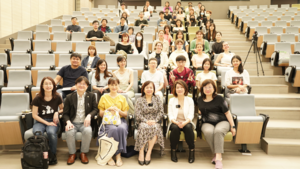

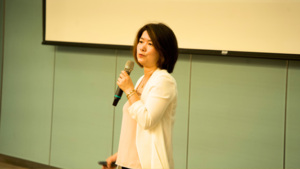
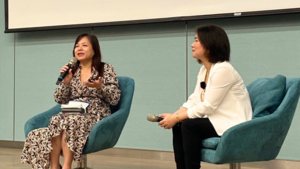
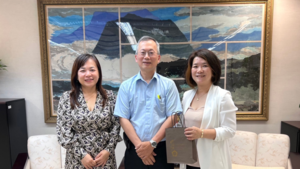
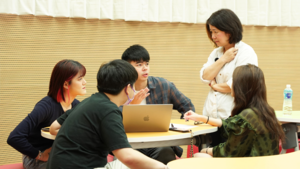
Date :
2024-04-22
Department :
Master’s Program in Global Communication and Innovation Technology
【Article by Master’s Program in Global Communication and Innovation Technology】
The Master’s Program in Global Communication and Innovation Technology (GCIT) invited Dr. Sunny Xun Liu, Research Director of Stanford University’s Social Media Lab to hold an open lecture on April 16, 2024, titled “Mind, Media, and Machines: Exploring the Psychological and Communication Dynamics of Artificial Intelligence (AI).” Held at the Yu-shan International Hall of National Chengchi University (NCCU), the lecture was hosted by GCIT Director Professor Trisha Lin and attended by close to 120 participants.
Noting that 2023 was the breakout year for generative AI, Dr. Liu’s presentation brought novel and rich research content, focusing on the interplay between AI technology, human psychology, and society. Topics covered included AI-mediated messages, AI’s implications with human cognition and mental health, AI ethics, as well as the future development of social science research in relation to AI. In addition to sharing various AI-related studies conducted by the Stanford Social Media Lab, Dr. Liu emphasized that the generation of false information and hallucinations by generative AI can erode trust and authenticity, and blur the line between humans and machines, leading to digital rights issues, amongst others. Director Lin said, “GCIT is honored to invite a renowned visiting scholar like Dr. Liu to share cutting-edge research relating to AI and generative AI, and explore the impact of such emerging technologies on human psychology and communication dynamics, with the NCCU community.”
In her presentation, Dr. Liu pointed out numerous areas that future AI research could explore, including enhancing users' trust in AI technology, addressing the problem of AI-generated misinformation, and understanding the influence of culture in the development model of AI. She reminded that when conducting responsible research, academics and researchers should consider important factors such as data governance, transparency, fairness, security, and personal privacy. One interesting finding was that AI-generated content tend to be more positive, persuasive, and effective, with people preferring to rely on algorithmic recommendations when making decisions. However, the effect diminishes when they learn that the message was generated by AI. When dealing with subjective matters, experts and the general public were more inclined to adopt human opinions compared to recommendations from algorithms. The presentation received enthusiastic responses from the audience, with questions ranging from cultural differences in AI models, the role of media to AI-related crimes. Associate Professor Sheng-Chih Chen of NCCU’s College of Communication praised Dr. Liu for her innovative presentation covering various AI-related topics and research findings, which enabled the audience to better understand the humanistic issues behind AI and its impact on interpersonal communication, in turn providing another reflection angle from the social sciences perspective.
During the previous day, Dr. Liu held a workshop on social media interaction research at NCCU’s Research and Innovation Incubation Center, sharing different frameworks and methods used for social media research and in evaluating communication psychology and behavior. She emphasized that the fundamental question of such research seeks to help users thrive with social media platforms and technology. The workshop also included a practical session where students discussed and formulated research questions and methods relating to generative AI and new technology in small groups. Dr. Liu mentioned she was impressed by the performance of GCIT students in being able to quickly put together excellent research proposals within a short time. GCIT third-year student Pei-chi Jao shared that she was honored to be able to participate in both events and praised Dr. Liu for explaining AI and social media, and their relation to human emotions and behavioral responses in a captivating and clear manner during the workshop. Through the feedback provided by Dr. Liu during the workshop, students were able to quickly grasp the essentials and directions of research development. Director Lin expressed hopes that both academic events would inspire GCIT students to conduct practical research that entails social impact and contributions.
During her visit, Dr. Liu also met with NCCU President Tsai-yen Li and had discussions about AI and Extended Reality (XR) research, as well as the life at Stanford University. At the recommendation of Director Lin, Dr. Liu also held in-depth exchanges with the Deans and faculty members of NCCU’s College of Communication and the International College of Innovation, establishing connections and possibilities for future exchanges and cooperation between NCCU and Stanford University. Director Lin also invited Dr. Liu to teach AI-related courses at GCIT in the future.
The Master’s Program in Global Communication and Innovation Technology (GCIT) invited Dr. Sunny Xun Liu, Research Director of Stanford University’s Social Media Lab to hold an open lecture on April 16, 2024, titled “Mind, Media, and Machines: Exploring the Psychological and Communication Dynamics of Artificial Intelligence (AI).” Held at the Yu-shan International Hall of National Chengchi University (NCCU), the lecture was hosted by GCIT Director Professor Trisha Lin and attended by close to 120 participants.
Noting that 2023 was the breakout year for generative AI, Dr. Liu’s presentation brought novel and rich research content, focusing on the interplay between AI technology, human psychology, and society. Topics covered included AI-mediated messages, AI’s implications with human cognition and mental health, AI ethics, as well as the future development of social science research in relation to AI. In addition to sharing various AI-related studies conducted by the Stanford Social Media Lab, Dr. Liu emphasized that the generation of false information and hallucinations by generative AI can erode trust and authenticity, and blur the line between humans and machines, leading to digital rights issues, amongst others. Director Lin said, “GCIT is honored to invite a renowned visiting scholar like Dr. Liu to share cutting-edge research relating to AI and generative AI, and explore the impact of such emerging technologies on human psychology and communication dynamics, with the NCCU community.”
In her presentation, Dr. Liu pointed out numerous areas that future AI research could explore, including enhancing users' trust in AI technology, addressing the problem of AI-generated misinformation, and understanding the influence of culture in the development model of AI. She reminded that when conducting responsible research, academics and researchers should consider important factors such as data governance, transparency, fairness, security, and personal privacy. One interesting finding was that AI-generated content tend to be more positive, persuasive, and effective, with people preferring to rely on algorithmic recommendations when making decisions. However, the effect diminishes when they learn that the message was generated by AI. When dealing with subjective matters, experts and the general public were more inclined to adopt human opinions compared to recommendations from algorithms. The presentation received enthusiastic responses from the audience, with questions ranging from cultural differences in AI models, the role of media to AI-related crimes. Associate Professor Sheng-Chih Chen of NCCU’s College of Communication praised Dr. Liu for her innovative presentation covering various AI-related topics and research findings, which enabled the audience to better understand the humanistic issues behind AI and its impact on interpersonal communication, in turn providing another reflection angle from the social sciences perspective.
During the previous day, Dr. Liu held a workshop on social media interaction research at NCCU’s Research and Innovation Incubation Center, sharing different frameworks and methods used for social media research and in evaluating communication psychology and behavior. She emphasized that the fundamental question of such research seeks to help users thrive with social media platforms and technology. The workshop also included a practical session where students discussed and formulated research questions and methods relating to generative AI and new technology in small groups. Dr. Liu mentioned she was impressed by the performance of GCIT students in being able to quickly put together excellent research proposals within a short time. GCIT third-year student Pei-chi Jao shared that she was honored to be able to participate in both events and praised Dr. Liu for explaining AI and social media, and their relation to human emotions and behavioral responses in a captivating and clear manner during the workshop. Through the feedback provided by Dr. Liu during the workshop, students were able to quickly grasp the essentials and directions of research development. Director Lin expressed hopes that both academic events would inspire GCIT students to conduct practical research that entails social impact and contributions.
During her visit, Dr. Liu also met with NCCU President Tsai-yen Li and had discussions about AI and Extended Reality (XR) research, as well as the life at Stanford University. At the recommendation of Director Lin, Dr. Liu also held in-depth exchanges with the Deans and faculty members of NCCU’s College of Communication and the International College of Innovation, establishing connections and possibilities for future exchanges and cooperation between NCCU and Stanford University. Director Lin also invited Dr. Liu to teach AI-related courses at GCIT in the future.


 Fax:886-2-29379611
Fax:886-2-29379611